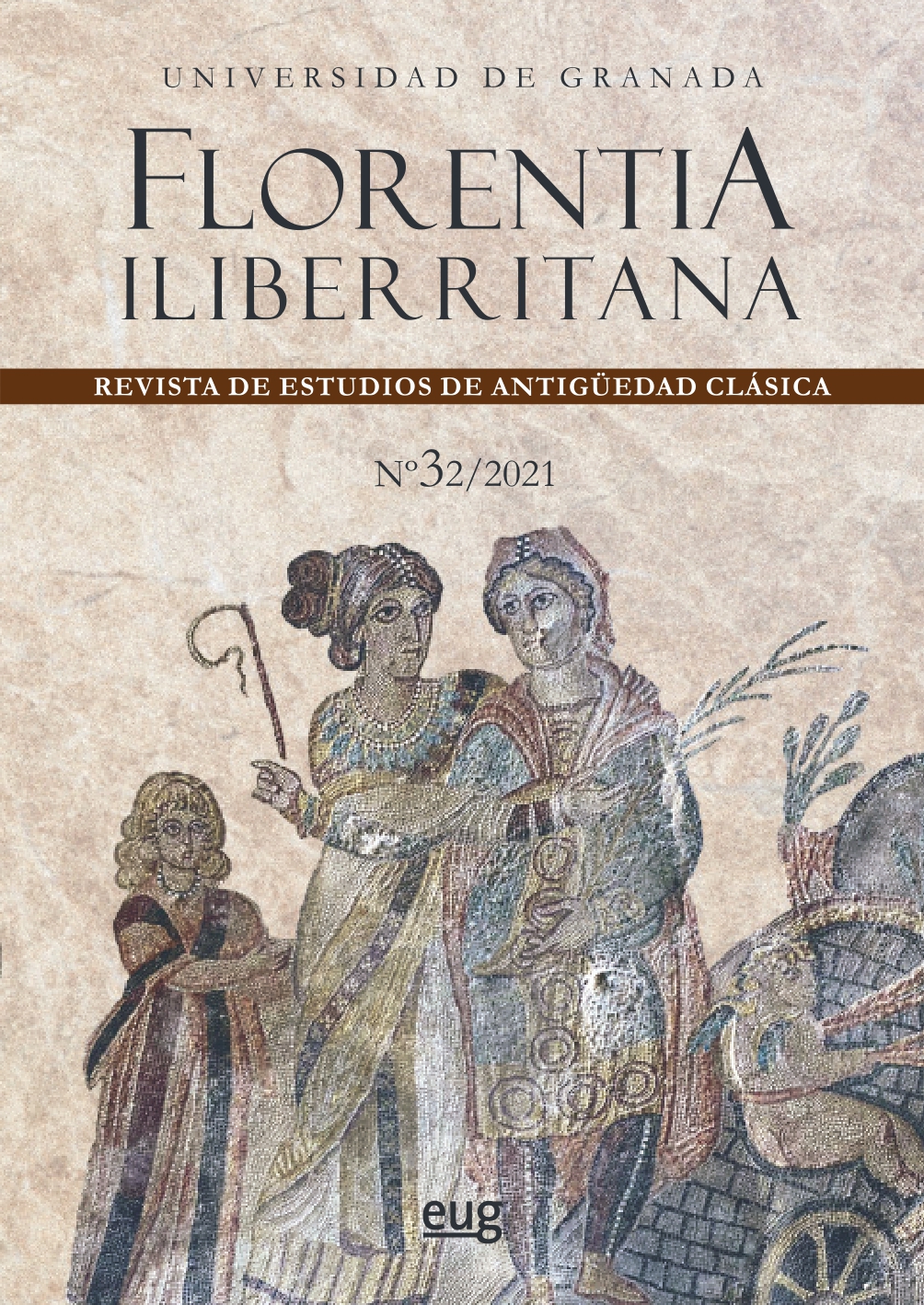Heródoto y el consejo al líder
DOI:
https://doi.org/10.30827/floril.v32i.24711Keywords:
advice, leaders, advisers, balance, destinyAbstract
The final objective of this article is to highlight the possible dilemma between destiny and rationality in the work of Herodotus. From the methodological standpoint, a concept has been selected, the advice to the leader, to visualize the rational background of the work of Herodotus, in a world where fate rules everything. A graphical method was purposely utilized to show the rational analysis and highlight the difference between the two worldviews (fate and rationality), allowing a comparison between the results of a quantitative study and the traditional keys in Herodotus’ Histories.
Downloads
References
BARON, Ch. A. (2021), The Herodotus Encyclopedia. New York, John Wiley & Sons, Incorporated.
BOWIE, E. (2018), Herodotus-narrator, scientist, historian. Berlin-Boston, Walter de Gruyter.
BROWN, T. S. (1982), «Herodotus' portrait of Cambyses», Historia: Zeitschrift für Alte Geschichte, 21.4: 387-403.
DEWALD. C. (1987a), «A selective introduction to Herodotean studies», Arethusa, 20.1/2: 9-40.
DEWALD. C. (1987b), «Narrative Surface and Authorial Voice in Herodotus' Historiés», Arethusa 20.1/2: 147-170.
DEWALD. C. (1999), «The figured stage: focalizing the initial narratives of Herodotus and Thucydides», in in T. M. Falkner et al., Contextualizing Classics: Ideology, Performance, Dialogue. Oxford, University Press: 221- 252.
DEWALD, C. & MARINCOLA, J. (2006), The Cambridge Companion to Herodotus. Cambridge, University Press.
FEHLING, D. (1989), Herodotus, and his' sources': citation, invention and narrative art. Leeds, Francis Cairns.
FINLEY, M. I. (1975), The Use and Abuse of History. London, Chatto and Windus.
FUENTE, D. H. DE LA (2009), «Oráculo y ley: una aproximación a la influencia política de la adivinación en la Antigüedad», Espacio, Tiempo y Forma. Serie II, Historia Antigua 22: 299-309.
FROST, F. J. (1968), «Themistocles' place in Athenian politics», California Studies in Classical Antiquity 1: 105-124.
GANDOLFI, F. & STONES, S. (2017), «The emergence of leadership styles: A clarified categorization», Revista de Management Comparat International, 18.1: 18-30.
GÓMEZ CARDÓ, P. (2017), «Una batalla, dos relatos: Temístocles en Salamina entre Heródoto y Plutarco», en M. Sanz Morales et al., Actas del XII Simposio Internacional de la Sociedad Española de Plutarquistas (Cáceres, 8-10 de octubre de 2015). Cáceres-Coimbra, Universidad de Extremadura: 109-120.
GORDILLO, C. A. R. (2017), «Heródoto y la comparación histórica del antiguo mundo mediterráneo», Historiografías: revista de historia y teoría 13: 13-33.
HARRISON T. & HARRISON, T. J. (2000), Divinity and history: the religion of Herodotus. Oxford, University Press.
HAU L., (2016), Moral History from Herodotus to Diodorus Siculus. Edinburgh, University Press.
HERODOTUS (1998), The Histories. Trans. by R. Waterfield, with an introduction and notes by C. Dewald. Oxford, University Press.
JACOBY, F. (1923), Die Fragmente der griechischen Historiker, 3 Teile. Berlin, Weidmannsche Buchhandlung
KONIJNENDIJK, R. (2016), «Mardonius' Senseless Greeks», The Classical Quarterly 66.1: 1-12.
LATTIMORE, R. (1939), «The wise adviser in Herodotus», Classical Philology 34.1: 24-35.
MACDOWELL D. M. & DOUGLAS, M. (1976), «Hýbris in Athens», Greece and Rome 23.1: 14-31.
MARINCOLA, J. (1987), «Herodotean narrative and the narrator's presence», Arethusa 20.1/2: 121-137.
MARINCOLA, J. (1997), Authority and tradition in ancient historiography. Cambridge, University Press.
MARINCOLA, J. (2005), «Concluding narratives: Looking to the end in classical historiography», Papers of the Langford Latin Seminar 12: 285-320.
MARINCOLA, J. (ed.) (2010), A companion to Greek and Roman historiography. Malden (MA), John Wiley & Sons.
MIKALSON, J. D. (2002), «Religion in Herodotus», en E. J. Bakker, I. J. F. de Jong & H. van Wees (eds.), Brill's Companion to Herodotus. Leiden, Brill: 187-198.
MOMIGLIANO, A. (1990), The classical foundations of modern historiography. Berckeley-Los Angeles-Boston, Univ of California Press.
MOMIGLIANO A. & GÁZQUEZ, J. M. (1984), La historiografía griega. Barcelona, Crítica.
MÜLLER, M. A. (2015), Moira. Destino y Libertad en el pensamiento antiguo. Tesis Doctoral, Universidad de Barcelona.
MUNSON, R. V. (1988), «Artemisia in Herodotus», Classical Antiquity 7.1: 91-106.
MUNSON, R. V. (2001), «ANÁNKĒ in Herodotus», The Journal of Hellenic Studies 121: 30-50.
PATERSON, D. (2002), The Function of Reciprocity in the Histories of Herodotus. Tesis Doctoral. University of Auckland.
PÉREZ MARTÍN, I. (2002), «Lectores y público de la historiografía griega», Estudios clásicos 44.121: 125-148.
PERSKY, R. K. (2009). Kairos: a cultural history of time in the Greek polis. Tesis Doctoral, University of Michigan.
PITCHER, L. V. (2007), «Characterization in ancient historiography», en J. Marincola (ed.), A Companion to Greek and Roman Historiography. Malden (MA), John Wiley & Sons: 102-117.
RAAFLAUB, K. A. (1987), «Herodotus, political thought, and the meaning of history», Arethusa 20.1/2: 221-248.
RAYMOND, G. A. (1997), «Neutrality norms and the balance of power», Cooperation and Conflict, 32.2: 123-146.
ROMM, J. S. (1998), Herodotus. New Haven-London, Yale University Press.
SARACHEK, B. (1968), «Greek concepts of leadership», Academy of management journal 11.1: 39-48.
SCHLOSSER, J. A. (2020), Herodotus in the Anthropocene. Chicago, University Press.
SIERRA MARTÍN, C. (2013), «Desde la lógica de Heródoto: Milcíades y el asedio de Paros» L’Antiquité Classique 82: 255-261.
THOMAS, R. (2002), Herodotus in context: ethnography, science and the art of persuasion. Cambridge, University Press.
















